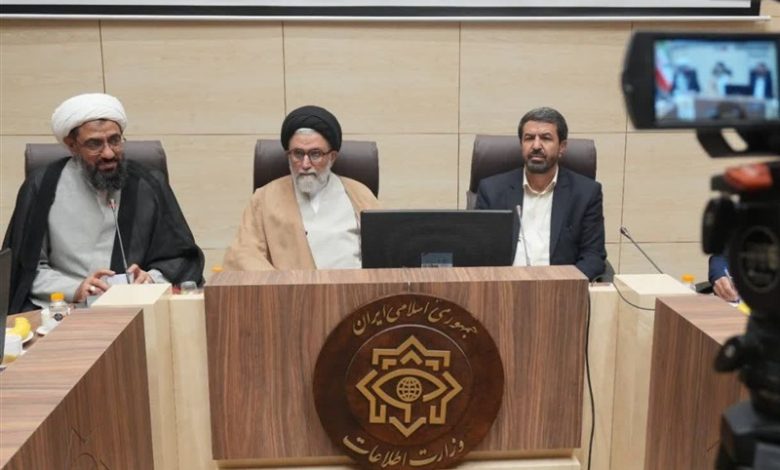A report on the deployment of terrorists to Iran’s borders for sabotage operations concurrent with the 12-day war.
Hojjatoleslam Khatib said that in the recent hybrid war, the enemies attempted to create insecurity in Iran by provoking Takfiri and ISIS elements in Syria and sending them toward Iran’s borders, especially the southeast, to carry out terrorist and sabotage acts — but, by God’s grace, they failed.

According to the Sedaye Sama News Agency, Hojjatoleslam Seyed Esmaeil Khatib, Iran’s Minister of Intelligence, speaking at the Security Council of Hamadan Province, referred to the enemies’ failures in various conspiracies against the Islamic Republic. He stated that the global hegemonic powers, using their most advanced technologies and military equipment, intended to target key centers and commanders of the country, but due to the vigilance of the armed forces and divine assistance, they did not succeed.
He added that the enemies sought to design a puppet government for Iran’s future and block diplomatic agreements and channels of hope for the nation, but these plans failed. According to the minister, one of the main aspects of the hybrid war against Iran was the use of media to impose their narrative on public opinion and to incite extremist groups to create insecurity in the country, which was also thwarted.
Khatib emphasized that the wise leadership of the Commander-in-Chief ensured that after every setback, new commanders with courage and insight were appointed, and the capabilities of the armed forces—especially missile power—brought great victories for the nation. He added that the enemies’ plans to smuggle weapons, provoke social dissatisfaction, and incite unrest through cyberspace were part of their efforts to overthrow and fragment Iran, but they failed.
He also referred to the internal crisis of the Zionist regime, noting that in its more than 70 years of existence, it had never experienced such instability. He said that the “Al-Aqsa Storm” operation and the actions of Hezbollah and Iran’s armed forces exposed the regime’s vulnerability. The minister described the enemies’ request for a ceasefire in the 12-day war as a sign of their weakness and a manifestation of Iran’s victory.
Khatib stated that the enemies’ plans were based on the assumption of public dissatisfaction and potential unrest in Iran, but the result was the opposite—the unity and solidarity of the people became even more evident. He referred to this as a “sacred unity,” as described by the Supreme Leader, and stressed that maintaining it requires sincere service and gaining the trust of the people.
The minister warned that the enemies are seeking to create polarization within Iranian society and emphasized the need for proactive planning to prevent any social divisions. He also praised the president’s approach to engaging various ethnic and religious groups, calling it an important factor in strengthening national unity.
Referring to the West’s war-mongering policies, Khatib said that the hegemonic powers have no hesitation in spreading war and destruction across the region. While claiming to defend human rights, they have caused humanitarian disasters in Gaza, Lebanon, Yemen, Iraq, and Syria, and even suppress protests within their own countries.
In conclusion, Khatib stressed that the Iranian people—despite their diverse opinions and lifestyles—remain united in support of the Revolution and its leadership. He said that it is now the officials’ duty to respond to this trust through compassion, effective service, and attention to people’s livelihoods. At the end of the session, the outgoing Director General of Intelligence for Hamadan Province was commended, and the new director was introduced.







